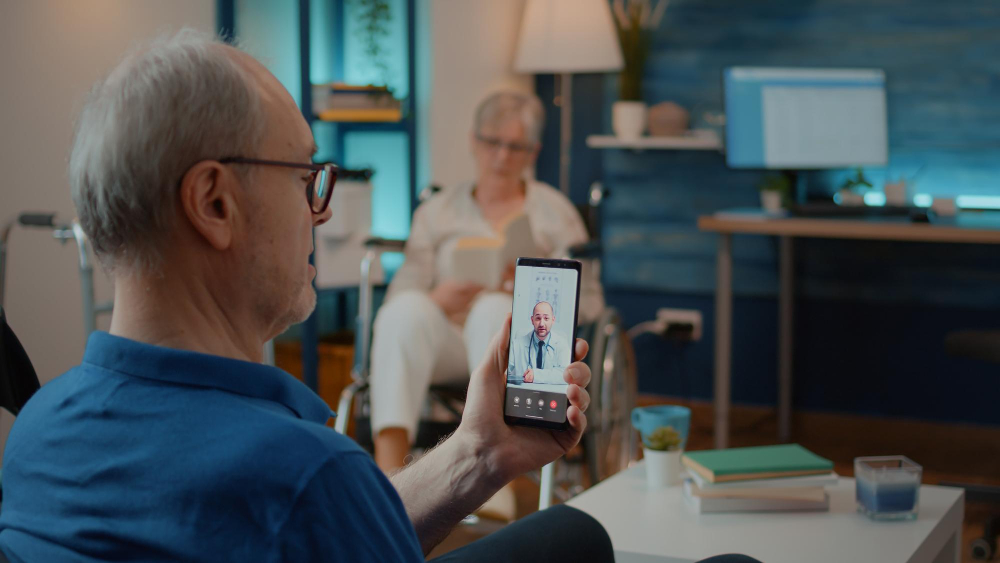Tired of the limitations of traditional healthcare? What if you can get the care you need, and when and how do you need it?
The healthcare industry is constantly evolving, and one of the most significant changes in recent years has been the rise of hybrid healthcare communications. This innovative approach combines the best of both worlds: traditional in-person care and modern virtual care, offering numerous benefits for both patients and providers.
Curious about how this revolutionary approach can improve your healthcare experience? In this blog post, we will explore everything you need to know about hybrid healthcare communications.
What is Hybrid Healthcare Communications?
A doctor talking to his patient online
Hybrid healthcare communications refer to a blended healthcare delivery model that incorporates both in-person and virtual interactions between patients and providers.
This approach allows patients to choose how they want to receive care, whether through face-to-face appointments, video consultations, phone calls, or secure messaging.
Benefits of Hybrid Healthcare Communications
Hybrid healthcare communications offers a wide range of benefits for both patients and providers, including:
- Improved access to care: Patients in remote or underserved areas can access healthcare services without traveling long distances.
- Increased convenience: Patients can schedule appointments at their convenience, without having to take time off work or arrange childcare.
- Enhanced patient engagement: Patients are more likely to be actively involved in their care when they can communicate with their providers through various channels.
- Reduced costs: Virtual consultations can be less expensive than in-person appointments, which can help to lower healthcare costs.
- Improved efficiency: Providers can see more patients in a day using virtual consultations, which can help to reduce wait times.
Use Cases of Hybrid Healthcare Communications
Routine Checkups
Gone are the days of taking time off work for routine checkups. With healthcare communication apps, you can now have virtual appointments with your doctor from the comfort of your home or office. Discuss your health concerns, get updates on your vitals, and even receive personalized recommendations – all through a secure video call.
Chronic Disease Management
Managing a chronic condition requires consistent monitoring and support. Healthcare communication apps offer a virtual lifeline for patients with chronic diseases.
Stay connected with your care team, track your progress, receive medication reminders, and access educational resources to empower your health journey.
Mental Health Counseling
Seeking mental health support has never been easier. Healthcare communication apps provide a safe and confidential space to connect with licensed therapists through video consultations or secure messaging. Receive personalized counseling, coping strategies, and ongoing support, all from the comfort of your chosen environment.
Medication Management
Keeping track of your medications can be challenging, but healthcare communication apps make it a breeze. Easily request prescription refills, discuss dosage adjustments with your doctor, and receive alerts for medication interactions or potential side effects.
Post-Operative Care
Recovering from surgery often involves frequent checkups and follow-up appointments. Healthcare communication apps enable you to receive post-operative care remotely, reducing the need for hospital visits. Communicate with your surgical team, monitor your healing progress, and get personalized guidance for a smooth and successful recovery.
These are just a few examples of how hybrid healthcare communications, powered by innovative apps, transform how we manage our health. Combining the convenience of virtual care with the personalized touch of in-person interactions is paving the way for a more accessible, efficient, and patient-centered healthcare experience.
Disadvantages of Hybrid healthcare Communication
is super convenient, but it has some hurdles to overcome:
- Not everyone has the tech: Some people don’t have good internet or the right devices for virtual visits. We need to make sure everyone can access this new way of getting care.
- Insurance coverage: It can be tricky to get insurance companies to pay for virtual appointments. We need to push for clearer rules so everyone can benefit from hybrid care.
- Keeping information safe: When it comes to our health records, privacy is key. We need to make sure virtual visits and apps are secure and protect our personal information.
- Learning new things: Not everyone is a tech whiz. We need to make virtual care simple to use so everyone can get the hang of it.
- Knowing when to go virtual or in-person: Some things are better-handled face-to-face with your doctor. We need to find the right balance between virtual and in-person care for the best results.
So, What’s Next for Hybrid Healthcare?
Hybrid healthcare is growing like crazy and changing how we get medical help. As technology gets even better, we’ll see even more amazing ways that virtual and in-person care can work together to make us healthier.
Hybrid healthcare is only going to get better and better. So, if you’re a doctor or nurse, it’s time to jump on board and see how you can use it to take care of your patients in the best way possible.
